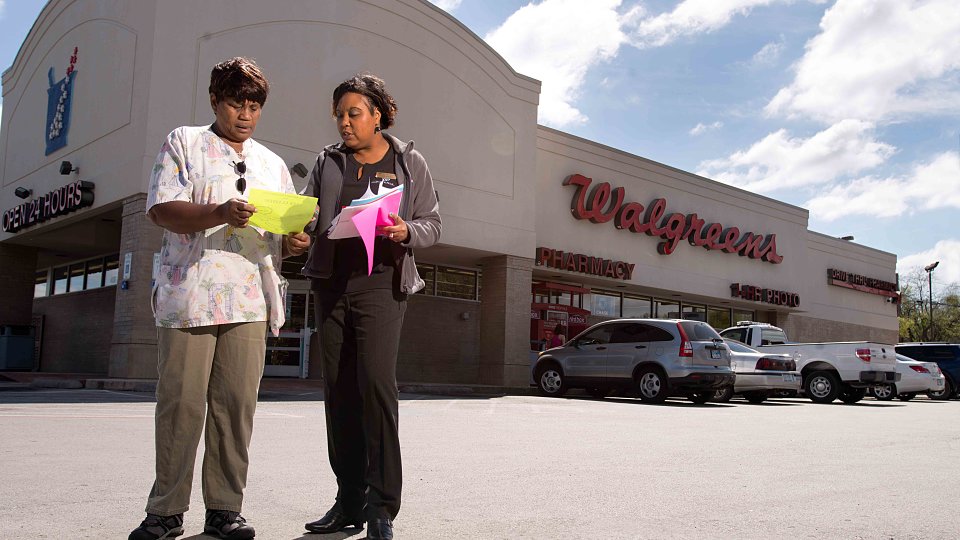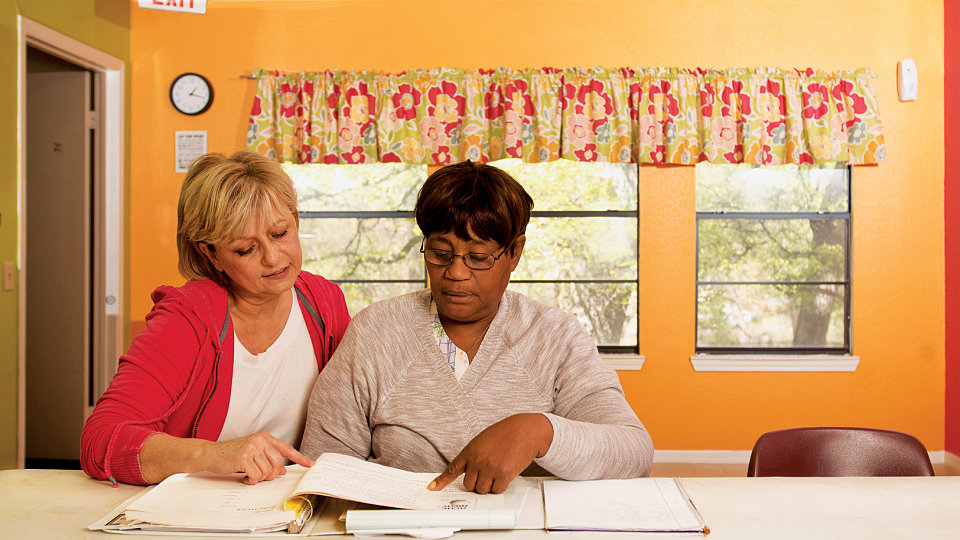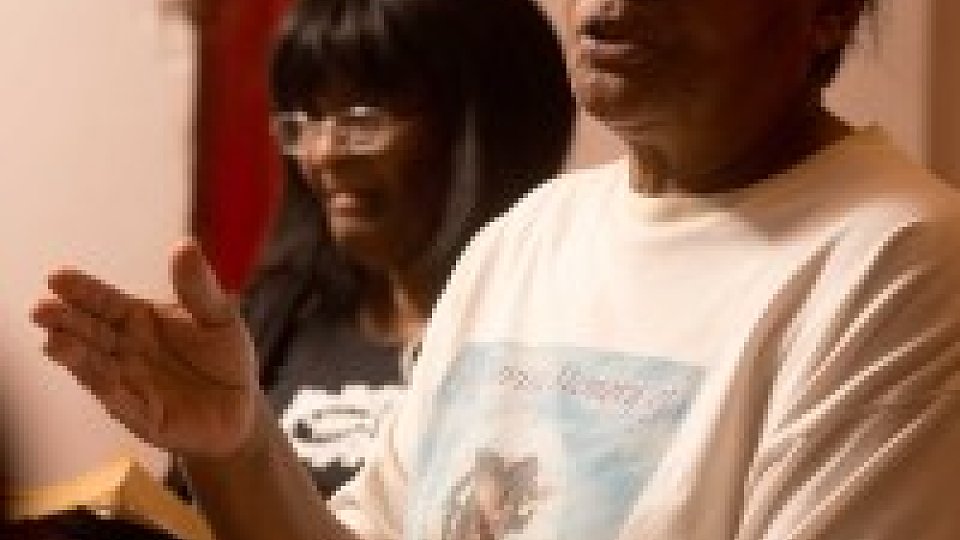Back to school: Family Hope Center volunteers teach participants joy of reading
Jerutha Platt needed to pick up her medication, one of many errands she had to run that day. She wanted to bounce in, pick up her pills and hop right back in her car to get on with her life. She didn't have time for what she saw standing in front of the Walgreens entrance - a lady with a handful of paper talking to everyone who passed.
Great, someone wanting money, Pratt thought. Money she didn’t have. Money she didn’t want to give if she did have it. A delay at best. Definitely a badgering, unnecessary hassle, and Pratt wasn’t in the mood.{C}
She got lucky as she approached the door of the South Dallas store. The lady was talking to someone else, and Pratt slipped by unnoticed. She picked up her medication with ease and headed out the store.
“Hello,” a calm voice greeted her. Drat. There’s only so much luck in the world, and her’s had dried up. Here it comes.
“Would you or someone you know be interested in learning to read?” the lady at the door asked, holding out a card. “We’re about to start a class at the Buckner Family Hope Center at Wynnewood.”
Lives change through day-to-day effort, small steps that, when combined, lead to drastic lifestyle
differences. Those journeys, the cliché says, start with one step, the hardest one of all. An alcoholic attending his or her first recovery meeting. A debt-ridden couple cutting up their credit cards. A woman who couldn’t read accepting a card from a stranger and asking when classes start.
“I could read a little, but I wanted to do better,” Pratt said. “I do a lot of work at the church, and it all involves reading and writing. I’m over the finances, the mission [visitation] and the usher committee.”
A secret
Admitting you can’t read might seem easier than it was. It might seem obvious if someone can’t read, but in Pratt’s case, it wasn’t. No one – not her children, friends or co-workers – knew she was illiterate.
“My second son always said, ‘If you’re not for sure, fake it until you make it,’” she said. “I learned how to fake it.”
What Pratt didn’t know about grammar and phonics, she made up for through observation and understanding people. She picked up on routines quickly, was good with numbers and asked for help when she needed it – without people realizing how they were helping her.
With her children, for instance, she promoted education, knowing she couldn’t help them with their homework. She wanted them to have what she didn’t. Pratt prayed multiple times a day that her children wouldn’t discover her secret.
“My kids thought I was a genius,” she said. “They didn’t know I didn’t have a sixth grade education. When they brought me their homework, I’d look at it like I was reading it. Then I’d look at them. Then I’d look at it. They didn’t know I didn’t know what it said. I’d give it back to them and tell them, ‘You make sure all of this is correct and clear. Don’t bring it back to me until it’s right.’”
At church, Pratt would show up slightly late for classes or slouch down in the back so she wouldn’t be called on to read. When she taught, she relied on the roughly 29 passages of Scripture she memorized. If she needed to share something new with a class, Pratt talked to her daughter about what she was learning in the Bible and pulled a lesson from that conversation.
Work was no different. She recognized what people wanted from her. She worked on circuit boards for nearly 28 years, doing the fine wiring between components. She didn’t know anything about circuit boards when she started, but she figured out what to do on the job.
“Once you’ve learned the routine, everything else falls in line. You’ve got to put yourself in a position to grow.”
In many ways, Pratt said, she’s the same as many other people. They may be able to read, but they are pretending to know something they truly don’t. They’re learning on the job, acquiring knowledge as they go.
“There’s a bunch of people in the world faking it,” she said.
A student again
A few weeks after meeting Cheryl Williams, director of the Buckner Family Hope Center at Wynnewood, outside Walgreens, Pratt started class. It meets twice a week for two hours at a time.
Students spend much of the time going through a workbook with a video course on a television. Facts, rules and questions come quickly, but Pratt keeps pace, responding aloud when appropriate and writing notes.
When the volunteer teachers see Pratt having trouble with parts of a lesson, they’re there to help.
“When my teachers see me fumble with it, they immediately go to the board and explain it to me,” she said. “They take the time out to catch me back up. When I go home, if I can’t figure something out I call them at their house. They’re always there for me.”
Pratt speaks highly of all three of her teachers, but she has particularly connected with Debbie Epperson. The two converse like old friends. They care about each other and are there for one another.
“We have a special bond,” Pratt said. “It’s like a friend, a mother and a pal. And don’t mess with the bond. Every time I dial the number, she’s there to support and help me. Even when I say something that isn’t even close to being right, she’s supportive and encourages me."
Epperson has seen Pratt’s self-confidence grow as she goes through the lessons. Each week, Pratt learns more, and the two have become trusted friends.
“We have forged a friendship,” Epperson said. “Our relationship started with reading, but it has grown so much deeper. She’s family.
“We come from different upbringings, but at our core we are no different. Teaching Jerutha to read has been one of the most rewarding things I’ve ever done because for her, it’s not just learning a new word, but changing her life.”
Pratt worked hard, studying six days a week. She began with small words. Then she put words together to create sentences. Eventually, the words and sentences got longer. By then, Pratt gained confidence and improved daily.
When she struggles, she’s encouraged by the memory of her younger brother, who died in 2000. Late in life, he told her, “There’s one thing I truly hate: I did not stay in school. I sit here and I hold the newspaper and I don’t know more than one or two words in it.” Pratt honors her brother by doing what he wished he could do.
Now in the middle of book two, she comfortably reads complex sentences and words. Occasionally she stumbles, but no more than most people reading aloud. Her ability grows with each class, as does her determination.
“I don’t know how many books there are, but I’m going to sit through all of them,” she said. “I’m going to keep going until my teacher says, ‘Jerutha, that’s your last book.’ I’m going to say, ‘Hallelujah!’”
'Better than prime rib'
Quite simply, the ability to read has made a difference in Pratt’s life every day. As with each person it serves, the Hope Center empowered Pratt to address a significant issue in her life, thereby
transforming her life.
Recently, she walked into a store and saw a sign hanging from the ceiling. A smile burst from her cheeks. For the first time, she was able to read and understand it. When her social security check and explanation of benefits came, she could read every word but one – and not even her daughter knew what that word was.
“This school means way more to me than prime rib,” she said. “And there’s nothing like a prime rib. There’s no earthly thing better to me than this school. This schooling has been one of the most joyful, blessed things in my life.”
Williams is inspired by Pratt’s commitment to learning. “I believe Mrs. Pratt has been more of a joy to us than we have been a help to her,” Williams said. “I have never seen such perseverance and determination from a student here. She is always on time and ready to work when she arrives. From the first day I met her, she has been serious about learning how to read, specifically her Bible. Her reading skills have so improved that she has been able to teach others.”
Pratt’s ability to read has made her more confident in what she believes. She delves into the Bible daily, enjoying the ability to take in the Word on her own. Reading has helped her grow spiritually, as well as share the gospel when she goes door-to-door visiting people.
And that class Pratt used to show up late for so she didn’t have to read? The one where she’d slouch in the corner hoping no one would call on her? It’s a little different as well:
“My mouth is the only one running in there now,” she said. “I tell you, I talk so much because I can read a whole line; I can read a whole sentence.”
During choir practice last week, her church asked if she would sing a song by herself during the service. Pratt was happy to. Then the choir director handed her a notebook with the music and lyrics to the song, and her nerves stood on edge. Dots danced on the page like a code she needed to break.
“I looked at the paper and put it down. I said, ‘Lord, here we go.’ I raised my head and looked at the paper. I didn’t have to ask a question about a single word. I knew them. That made me feel good.”








Add a Comment